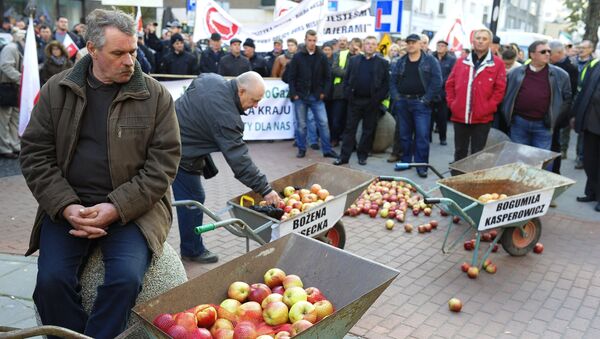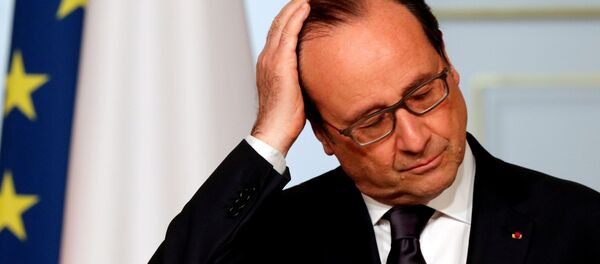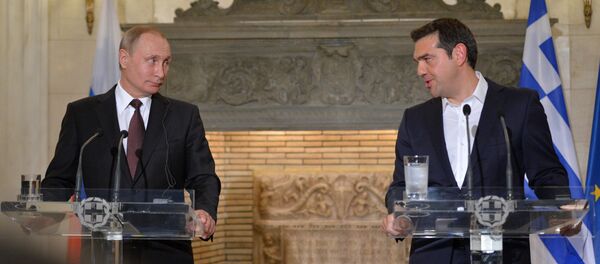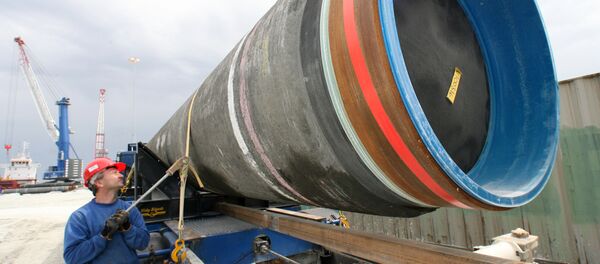Last week, US Deputy National Security Advisor Ben Rhodes told reporters that the White House is concerned that Russia may be trying to promote divisions within Europe, as well as divisive attitudes toward the United States.
"There have been some efforts from Russia to essentially try to sow some discord or dissention within Europe," Rhodes said, adding that Moscow has "a very loud megaphone in this part of the world and you see efforts to try to pull apart the threads of European and trans-Atlantic unity."
Speaking about the results of a meeting with EU officials on Friday, Rhodes emphasized that they had "reaffirmed their commitment to maintaining the sanctions that are on Russia so long as there continues to be infringement on the sovereignty and territorial integrity of Ukraine."
Since the 2014 Maidan coup d'état, officials in Washington and Brussels have regularly and baselessly accused Russia of 'infringing on Ukraine's sovereignty', all the way up claims that thousands of regulars from the Russian army were fighting in that country's civil war.
Meanwhile, economists have calculated just how big a strain the West's anti-Russian sanctions have been, with French international economics institute CERPII revealing that the diplomatic conflict between Russia and the West had cost the latter over $60.2 billion US between early 2014 and mid-2015. The countries of the European Union bore the brunt of the economic losses, accounting for nearly 77% of all trade losses, according to the institute.
According to CERPII's calculations, Germany's economy suffered most heavily, with trade losses averaging over $832 million a month, or 27% of Western countries' total. The Polish and Dutch economies were also hit hard by Moscow's countersanctions, while the US and the UK were not heavily affected, accounting for only 0.4% and 4.1% of all sanctions-incurred losses, respectively.
"Tellingly," Polunin suggested, "in three of the four resolutions, there was also a provision recognizing Crimea as a Russian territory." The predominantly Russian-speaking population of the peninsula had voted to secede from Ukraine and join Russia in March 2014, amid the chaos that followed the Maidan coup.
Italian regions are not the only ones pushing for a review of the ruinous sanctions policy. Also last week, the parliament of the Mediterranean island nation of Cyprus voted to lift EU sanctions against Moscow, suggesting they were counterproductive in the effort to resolve the crisis and civil war in Ukraine. A month earlier, the French Senate overwhelmingly endorsed a resolution calling for the softening of sanctions.
"Of course, it's clear that all these resolutions are purely advisory in nature," Polunin pointed out. "Foreign policy issues are in the competence of the heads of state and foreign ministries, not regional government or parliaments."
"The question," Polunin wrote, "is when and how this occurs."
Speaking to the newspaper, Tamara Guzenkova, the deputy director of the Russian Institute of Strategic Studies, suggested that effectively, Washington will try to do everything in its power to prevent a Russian-European rapprochement.
"The US position on sanctions [against Russia] is directly tied to their interest in pushing through the strategic Transatlantic Trade and Investment Partnership (TTIP)," the analyst noted.
"The economic destabilization of the EU caused by sanctions and counter-sanctions was deliberately provoked by the US to ensure that Europe broke away [from economic interaction with Russia] and moved further into the arms of the Americans. But the Europeans have discovered problem spots in this 'genius' American plan."
These leaks, which caused an uproar among the European capitals, "provided Europeans with a serious reason to doubt whether or not to conduct their policy according to Washington's dictate." Moreover, for some time, the scandal around the TTIP also strengthened the anti-sanctions mood in the continent, with the Brexit referendum "only adding fuel to the fire."
All this, Guzenkova noted, led Europeans, including many lawmakers, to ask themselves a rhetorical question: "Why should Germany and France continue to adhere to sanctions which are against their own interests for the sake of the United States?"
"Therefore, in my opinion, the current anti-sanctions mood in Europe is secondary and subordinate to something else: it is only part of an overall reflection by EU countries on how to behave in relation to the United States, and whether to follow blindly in the footsteps of US policy."
As far as Russia is concerned, Guzenkova suggested that for now, these "small breakthroughs" may do much "to boost Moscow's ego, [but] they have not fundamentally shifted the balance of power. Still, I think that we are moving toward an adjustment of European sanctions policy – if not to the total lifting of sanctions, then at least toward their fragmentation and gradual weakening. If France and Germany, the main proponents of European integration, are to push this policy, progress is possible."
Ultimately, Guzenkova noted that for now, "the time of the political forces that could change the sanctions policy has not yet come. But the preconditions for radical changes in the European political landscape are in place."
For his part, Mikhail Remizov, the president of the Moscow-based Institute of National Strategy, suggested that the shift in Europe is also connected to Europeans' realization that Russia is not to blame for stalling the Minsk peace process in eastern Ukraine.
"We are now at a point where the Minsk process has been exhausted, but this has not yet been recognized," the analyst suggested. "This, and not just the economic factor, is why European support for anti-Russian sanctions is growing increasingly unpopular," he added.
Remizov recalled that officially, the sanctions are connected to the fulfillment of the Minsk Agreements on peace in eastern Ukraine. This, he said, "is beginning to look strange to a growing number of Europeans. They understand that despite the West's tendency to blame everything on Russia, it is difficult to deny the responsibility of the state where the conflict is going on in the first place for its settlement."
Ultimately, in Remizov's view, if and when it is recognized that the anti-Russian sanctions can no longer be tied to the fulfilment of the Minsk accords, politicians in Europe and the US will find some other reason to continue the sanctions policy.
"The opposite can happen only if Europe recognizes Ukraine's overriding responsibility for the failure of the peace process. Unfortunately, such a scenario is, in my opinion, unlikely," the analyst concluded.









